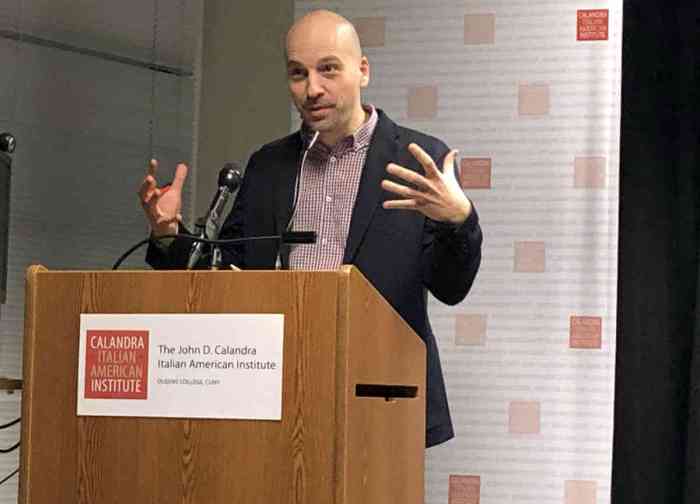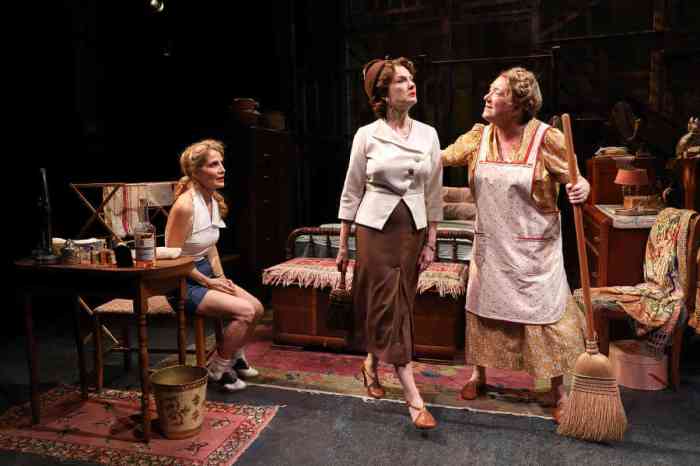Cherry Jones and Zachary Quinto in “The Glass Menagerie” at the Booth Theatre. | MICHAEL J. LUTCH
Memory is a particular affliction of the human species. It shapes our present, drives us, unsettles us, even haunts us. Memory is the subject of Tennessee Williams’ classic play “The Glass Menagerie,” which has never been so powerfully or poetically examined as in the spellbinding, ravishing revival now on Broadway.
Under the brilliant direction of John Tiffany, this production is immediate and visceral, steeped in its period but resonating with an emotional intensity both shocking and beautifully underplayed. Tiffany has trusted the script — and Williams’ original directions from 1944 — to create a world as it would appear in memory, dimly lit and lacking in detail yet powered by conflict and the longing for a resolution that may be impossible to attain.
The simple story concerns the Wingfield family — Amanda and her adult children Laura and Tom. Tom narrates the play from about 10 years after the events take place. It is his memory. Amanda, once a southern belle, is living in reduced circumstances in a cramped apartment in St. Louis since her husband abandoned them. Tom provides the family’s sole support working in a warehouse boxing shoes while Laura, crippled and pathologically shy, stays home and plays with her glass animals — the menagerie of the title. Amanda is desperate for Laura to be provided for and knows that her son itches to leave behind the stultifying life they share. A poet who wants to break free, he is bound by a sense of duty. Amanda ultimately prevails on Tom to bring home a young man for Laura, but dreams are dashed and Tom leaves, finally driven away by Amanda’s overbearing desperation.
“The Glass Menagerie” is what memories are made of
Amanda is often portrayed as a monster and almost a caricature, but here —in an absolutely breathtaking performance by Cherry Jones — she is a real woman forced to find her way in a world she was never intended to inhabit, fighting not just for her own survival but that of her family as well. The weapons at her disposal — charm, vivacity, and flirtation — are useless in the world she finds herself in. Having nothing else to turn to makes her tragedy more poignant. Yes, Amanda is suffocating to both Tom and Laura, but it’s not maliciousness but blindness that makes her so. Even as she tries to protect her children, she can’t help but injure them.
What Does It Mean to Be Queer?: A Fall Arts Special. | MICHAEL SHIREY
Jones has such command of the role, giving the character such richness, that Amanda becomes sympathetic and multi-dimensional. When the Gentleman Caller arrives and Laura is afraid to answer the door, Amanda says, “I must give you courage… for life.” It is a moment that resonates on many levels, illuminating the character in a way not seen before. It is one of many moments in Jones’ performance that left me with a lump in my throat, aching for Amanda — not a typical response to this character.
When coupled with the mesmerizing performance of Zachary Quinto as Tom, the effect is a portrait of a family bound — nay, strangled — by love. Quinto is fully present in each moment, but never lets us forget he is also outside this story as the narrator and that this is all his memory. He wrestles with the conflict between love of his mother and his yearning to find his own adventure. Quinto has a remarkable facility with Williams’ language and a simplicity and clarity that serve the role in ways I’ve not seen before.
Remarkably, Celia Keenan-Bolger as Laura is as powerful as Jones and Quinto. We never know why Laura is as she is, but she is surely the anchor and glue of the family. Both Tom and Amanda love her passionately, but while Amanda wants to find someone to replace herself as Laura’s protector, Tom wants her to find the spine to at least go to the movies. Keenan-Bolger plays Laura as acutely aware of her situation and dying to let go. She almost does with the Gentleman Caller, “an emissary from the world we were somehow set apart from,” as Tom says. But it is not to be, and our hearts, Laura’s heart, and her glass unicorn are broken in an instant.
The depth of this production is almost overwhelming. Bob Crowley’s set design surrounds the world with a pool of black liquid that serves as a metaphor for memory. Quotidian moments of setting the table and eating are carried out with beautiful, stylized movements that remind us that we are not living in reality but in Tom’s mind. For all of us, there are things we can never forget. Happily, this production is one of those.
THE GLASS MENAGERIE | Booth Theatre, 222 W. 45th St. | Tue.-Thu. at 7 p.m.; Fri.-Sat. at 8 p.m.; Wed. at 2 p.m.; Sun. at 3 p.m. | $42-$147 at telecharge.com or 212-239-6200




































